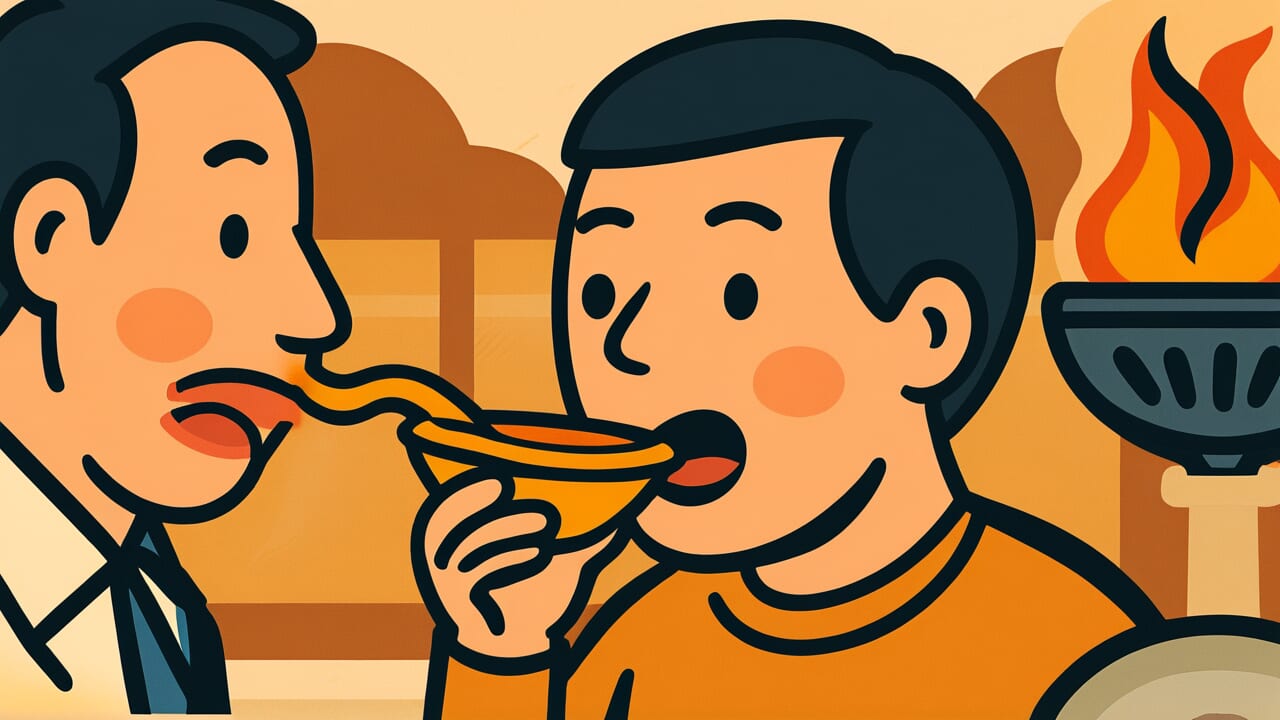How to Read “Burn your cheek on a single bite”
Hitokuchi mono ni hō wo yaku
Meaning of “Burn your cheek on a single bite”
“Burn your cheek on a single bite” comes from the experience of burning the inside of your cheek when you rush to eat hot food.
It means jumping into something without proper preparation or careful thought, and then suffering painful consequences as a result.
This proverb warns us about a common human weakness. We get blinded by immediate benefits or attractive opportunities.
We act without thinking carefully about the risks or dangers involved. Just like we can’t wait to eat delicious-looking food, we feel the urge to jump at profitable deals or tempting offers.
Everyone experiences this impulse. But the proverb teaches us to pause and think calmly before acting.
In business, this applies when people invest or sign contracts without proper research. In relationships, it happens when we get deeply involved with someone we barely know.
In daily life, we see it when people blindly follow trends or other people’s advice.
Modern society floods us with information. We often face pressure to make quick decisions.
This makes the proverb’s lesson about carefulness even more important today. Taking time to think carefully has become more valuable than ever.
Origin and Etymology
The exact origin of this proverb in historical texts is unclear. However, the words clearly come from everyday Japanese eating experiences.
“Hitokuchi mono” means food that’s bite-sized. When we face steaming hot dishes, we naturally want to eat them right away.
This urge becomes even stronger when we’re hungry or when the food looks especially delicious. But rushing to put hot food in your mouth burns the inside of your cheek.
Almost everyone has experienced this pain at least once.
This physical pain became a metaphor for life’s failures. Burning your cheek on hot food is temporary, but it ruins the enjoyment of your meal.
Similarly, rushing into things and failing means losing the benefits or joy you could have gained. This is the lesson embedded in the proverb.
Japanese food culture often serves dishes piping hot. Waiting for food to cool to the right temperature has been considered a virtue.
This proverb was born and nurtured within this cultural background. It represents the crystallization of wisdom passed down through generations.
Usage Examples
- I hope that investment deal doesn’t turn into “burn your cheek on a single bite” – did you research it properly?
- I “burned my cheek on a single bite” last time, so this time I’ll read every detail of the contract before deciding
Universal Wisdom
“Burn your cheek on a single bite” has been passed down through generations because it reflects deep insight into human weakness.
We humans are creatures whose desires often override our reason when we see something attractive.
This impulsiveness actually comes from our survival instinct. The urge to eat immediately when seeing food was necessary for survival when food was scarce.
But in modern society, this instinct can put us in danger. Investment scams, bad contracts, and relationship troubles often stem from rushing too much.
What’s interesting is how this proverb teaches through physical pain – the burn. Everyone has experienced burning the inside of their cheek, and that memory stays vivid.
Our ancestors used this familiar, concrete pain to make the abstract danger of recklessness feel more real and immediate.
Humans learn from failure. But ideally, we’d rather learn from others’ experiences and ancestral wisdom before suffering ourselves.
This proverb was born and passed down for exactly that purpose. The difficulty of balancing desire and reason, and the value of carefulness – people hundreds of years ago felt these same challenges we face today.
When AI Hears This
The moment hot food enters the mouth, thermal energy begins transferring to the mucous membranes. This heat transfer rate follows physical laws that human will cannot change.
Meanwhile, our brain completes the information processing of “I want to eat now” instantly and issues action commands. Here lies the fundamental problem.
Information processing happens through electrical signals at near light speed. But heat diffusion is a physical process of molecular vibration, incomparably slower.
This speed difference creates burns – “irreversible information loss.” Once cells are burned, they cannot return to their original state.
In thermodynamics, this is entropy increase – a one-way change from order to disorder. What’s interesting is that choosing to wait and let food cool allows temperature to approach equilibrium with surrounding air.
The temperature difference with the mouth narrows. This method gradually increases entropy across the entire system, avoiding rapid local entropy increase – the burn.
This proverb demonstrates that an optimal synchronization point exists between two systems operating on different time scales. High-speed decision-making circuits and slow physical phenomena need coordination.
When the speed of information processing ignores material world constraints, irreversible damage occurs to the entire system. This universal principle applies not just to food, but to all complex systems.
Lessons for Today
This proverb teaches modern people the value of “the power to wait.” In an age when information arrives instantly and shopping happens with one click, taking time to think has become harder.
Money-making schemes on social media, limited-time sales, contracts demanding immediate decisions – modern society is full of mechanisms that pressure us to decide quickly.
But truly valuable things don’t disappear if you wait a little. In fact, offers that rush you deserve extra caution.
Specifically, I recommend developing the habit of “sleeping on it” before important decisions. Just as you wait for hot food to cool, wait for excited emotions to settle.
When you review things calmly the next day, you often notice risks you couldn’t see before.
Consulting trusted people is also important. Others’ eyes can spot dangers you might miss alone.
When you’re in a hurry, have the courage to deliberately stop. Those few minutes or hours of waiting time will protect you from major failures.



Comments